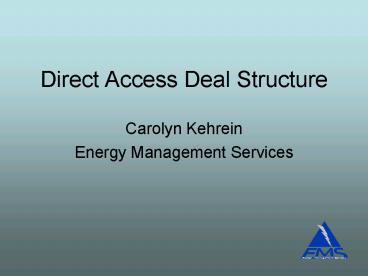Direct Access Deal Structure
1 / 8
Title:
Direct Access Deal Structure
Description:
Deal Structures allocate the risks between the parties. In the beginning of DA (1998 and 1999) ... It takes significant internal resources to negotiate contracts ... – PowerPoint PPT presentation
Number of Views:166
Avg rating:3.0/5.0
Title: Direct Access Deal Structure
1
Direct Access Deal Structure
- Carolyn Kehrein
- Energy Management Services
2
DA Deal Structures
- Deal Structures allocate the risks between the
parties - In the beginning of DA (1998 and 1999), the
supplier took most of the risk - Since 2001, DA customers have had to take a
greater share of the risk because - 1) Premium prices products are too expensive
- 2) Suppliers are more risk averse
3
Deal Structure Examples
- 1998 and 1999
- or discount off bundled tariff
- or discount off the PX Credit
- Summer 2001
- Fixed Price for Load Following Product
- (with usage tolerance bands)
- Fixed Price for Block of Power
- (customer takes imbalance risk)
- Load Following Product Normally Priced at a
Premium
4
Internal Contracting Realities
- It takes significant internal resources to
negotiate contracts - It takes time for internal approvals of contracts
and pricing confirmations - Prices are good for minutes not days
- Prices are different before and after a contract
is awarded - Many companies cannot jump at an opportunity if
it requires a contract approval
5
Natural Gas Deal Structure
- Natural Gas Deal Structure
- Cost NYMEX Basis LDC Costs
- Power Analogy
- Cost Block Load Shaping ESP Fees ISO
6
Unbundling Power Commodity Cost
- Power Commodity Cost
- Block Load Shaping ESP Fees ISO
- Block transparent, liquid market like NYMEX
- Load Shaping can be unbundled
- ESP Fees can be unbundled
- ISO Charges pass through under all scenarios
7
RFP Mechanics
- Block Price
- Bid specifies that buyer can buy at the
then-current InterContinental Exchange (ICE) SP15
forward price at any time. - Suppliers bid Load Shaping Service and ESP Fees.
Fees include cost of converting ICE to
block/wholesale quote and are specified for
duration of contract.
8
Result
- Customer unable to take load shaping risk can
- buy power competitively at any time,
- select market timing and purchase durations, and
- react to changes in the market
- Without being overcharged for the commodity































